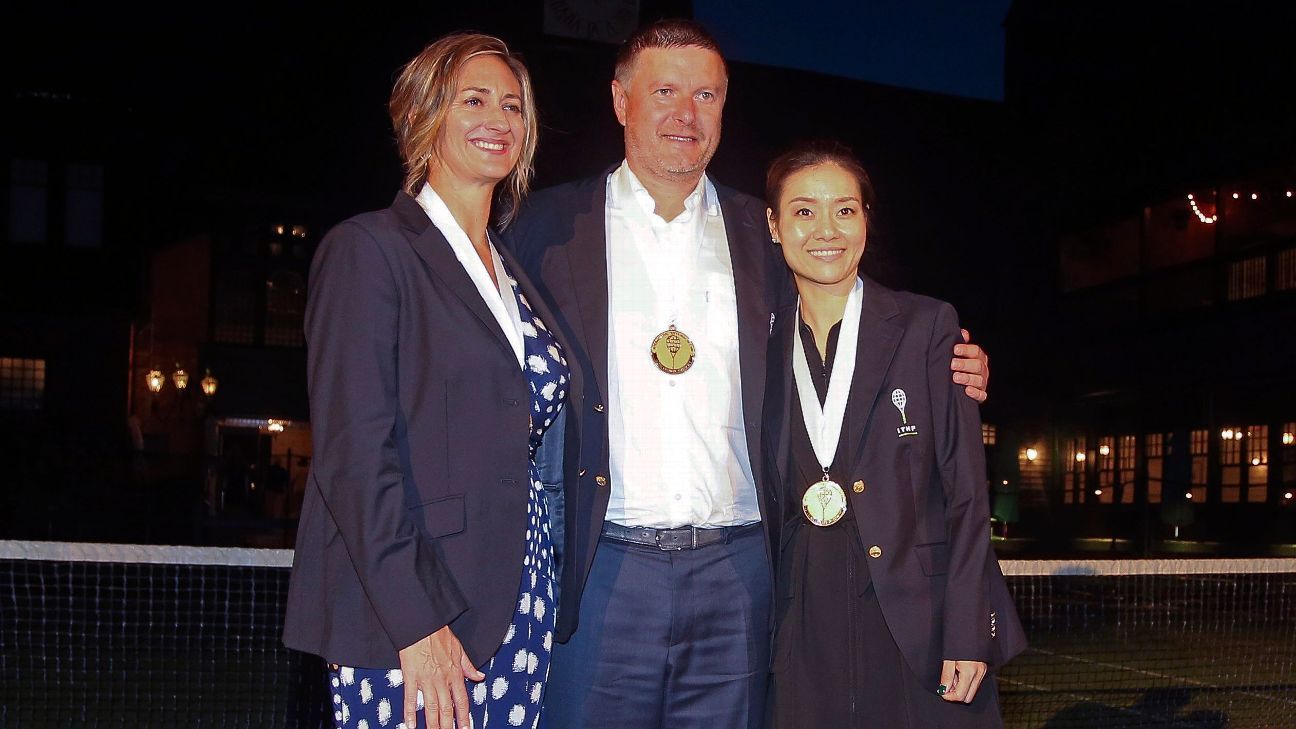NEWPORT, R.I. — Speaking to an expectant audience Saturday night at her 2019 International Tennis Hall of Fame induction ceremony, Li Na kept her speech succinct but full of gratitude.
“Tennis has taken me around the world to explore different countries. And because of this great sport, I have learned to have more self-control and become better organized,” the 37-year-old former world No. 2 said. “I will do all I can to inspire, to help more young and upcoming players and hope they can enjoy this amazing sport.”
Thousands of miles away in her home country of China, tens of millions of people might also be waking up to witness this historic moment closely unfold. Five years after retiring from a decorated and storied career, Li is carrying on her spirit as a unicorn of her time and beyond.
“To Chinese tennis, Li Na is a generational figure,” said Xin Wan, an veteran journalist who followed Chinese tennis for years. “Her success on the global stage has introduced not only the game of tennis to Chinese people, but also Chinese tennis to the world.”
A key component to Li’s on-and-off court accomplishments, longtime agent and friend Max Eisenbud has witnessed firsthand the highs and lows of every moment in Li’s career.
“I believe Li Na is a maverick who has been carrying Billie Jean King’s legacy in China for today’s generation,” Eisenbud said in his introductory speech of Li during the ceremony. “She wasn’t afraid to be outspoken. She wasn’t afraid to stand up for her beliefs. No matter what, she believed in herself. “
“Just like Billie Jean [King], Li Na brought about social change and transcended her sport. When Li Na played her first-ever professional tennis match in 2000, there was only one WTA event in China. This year, there are nine in China, more than any nation.”
Indeed, maverick might be perhaps the best description of Li. As an athlete, she was bold, truthful to her own character, and known for always speaking her mind. Anecdotes of her not holding back frustrations, even toward husband Dennis during intense match actions, have over the years painted an authentic image of Li to hundreds of millions Chinese fans. Li’s influence, achieved through overcoming obstacles on and off the court, has made her more than an athlete.
“Without a doubt, Li Na has transformed a new height for Chinese tennis,” Zhang Shuai, one of China’s top female players today, told ESPN.com. “She has made the world aware that Chinese athletes can also achieve excellence and recognition in tennis at a high level.” “More and more Chinese parents are now hopeful that their children can become a superstar like Li Na one day.”
To this date, Li stands as one of the most influential athletes from China. Along with basketball legend Yao Ming and former Olympic 110-meter hurdles gold medalist Liu Xiang, Li is arguably one of the most powerful global athletes the country has ever produced. Before the era of these three, who are also similar in age, Chinese athletes had rarely broken outside their traditional realm of dominance — namely table tennis, gymnastics and diving — into sports like track and field, basketball and tennis.
Li won the 2011 French Open to become China’s first Grand Slam singles champion, and she won her second major in 2014 at the Australian Open.
Altogether, Yao’s NBA entry in 2002 as the first international No.1 overall pick, Liu’s 2004 gold medal in Athens, and Li’s historic 2011 French Open victory, have since created a new era of Chinese sports and a different image for Chinese athletes — confident, competitive, relatable and willing to share their sense of humor, said Wan.
At Yao’s 2016 Basketball Hall of Fame induction ceremony, the audience burst out laughing when he inserted a clever reference of Allen Iverson’s infamous “practice” rant into his speech.
This time, Li might have taken a page from Yao’s playbook. “In the past five years, I have enjoyed better work and life, and most importantly I got two children,” she said, followed by a brief pause. “And yeah, the same husband.”

